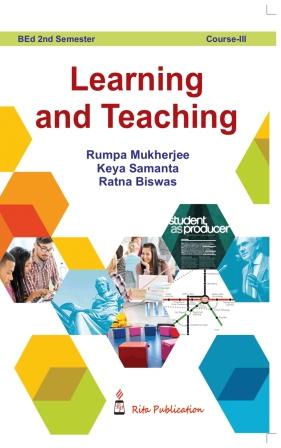CC-03_Learning and Teaching-RUMPA MUKHERJEE
CC-03_Learning and Teaching-RUMPA MUKHERJEE is backordered and will ship as soon as it is back in stock.
Couldn't load pickup availability
Genuine Products Guarantee
Genuine Products Guarantee
We guarantee 100% genuine products, and if proven otherwise, we will compensate you with 10 times the product's cost.
Delivery and Shipping
Delivery and Shipping
Products are generally ready for dispatch within 1 day and typically reach you in 3 to 5 days.
Authors: Rumpa Mukherjee, Keya Samanta, Ratna Biswas
Syllabus:
?1st Half: Learning
Unit I: Understanding Learning:
- Nature of learning: learning as a process and learning as an outcome
- Types of learning: factual, associations, conceptual, procedural, generalizations, Principles and rules.
- Remembering and Forgetting?Factors of remembering?encoding, storage and retrieval. Information processing approach; Causes of forgetting; Strategies for effective memorization.
Unit II: Factors Influencing Learning:
- Concept, nature and types of motivation?intrinsic, extrinsic and achievement.
- Role of teacher in addressing various factors influencing learning?a few strategies?cooperative learning, peer tutoring, collaborative learning.
Unit III: Learning Paradigms:
- Behavioristic Learning?Concept of connectionism (Thorndike) and conditioning (Pavlov & Skinner) and their educational implications.
- Cognitive Learning?Concept of Gestalt and its educational implications; Discovery learning (Bruner), Cognitive Constructivist Learning (Piaget)
- Social Cognitive Learning?Concept (Bandura), nature and implications. Teacher as role model.
- Social Constructivist Learning?Concept of Vygotsky, nature and implications.
- Humanistic Viewpoint of Learning?Carl Rogers (Self Concept Theory)
Unit IV: Overview of theories of Transfer of learning:
- Concept, Importance, Nature and Types of Transfer of Learning
- Theories of Transfer of Learning
- Methods of enhancing Transfer of Learning
Unit V: Organization of Learning Experiences: Issues and Concerns:
- Role of school?Guidance, Mental health, Co-curricular activities.
- Strategies for organizing learning for diverse learners?Brainstorming, Within class grouping, Remedial teaching, Enrichment programme.
?2nd Half: Teaching
Unit I: Understanding Teaching :
- Teaching: Concepts, definition, nature and characteristics factors affecting teaching.
- Relation between Teaching, Instruction and Training.
- Maxims of teaching?Role of teacher in effective teaching.
Unit II: Models of Teaching:
- Concept Attainment Model (CAM)
- Advance Organizer Model (AOM)
- Inquiry Training Model (ITM)
Unit III: Task of Teaching:
- Task of teaching: meaning, definition and variables in teaching task.
- Phases of teaching task: pre-active, inter-active and post-active.
- Essentials of effective teaching.
Unit IV: Levels & Approaches of Teaching:
- Levels of Teaching: memory, understanding and reflective levels of teaching
- Approaches to Instruction: Constructivist approach to teaching, Cooperative and Group Discussion, Games, Debate, Quiz and Seminar.
- Programmed Instruction (PI) & Computer Assisted Instruction (CAI)
Unit V: Skills of Teaching:
- Skills of Teaching: Concepts, definition.
- Micro-teaching: Meaning and Procedure
- Developing Teaching skills: Introducing the lesson, Questioning, Use of teaching aids, Reinforcement and Illustration.
- Modification of Teacher Behaviour-Flanders Interaction Analysis of Category System (FIACS).





